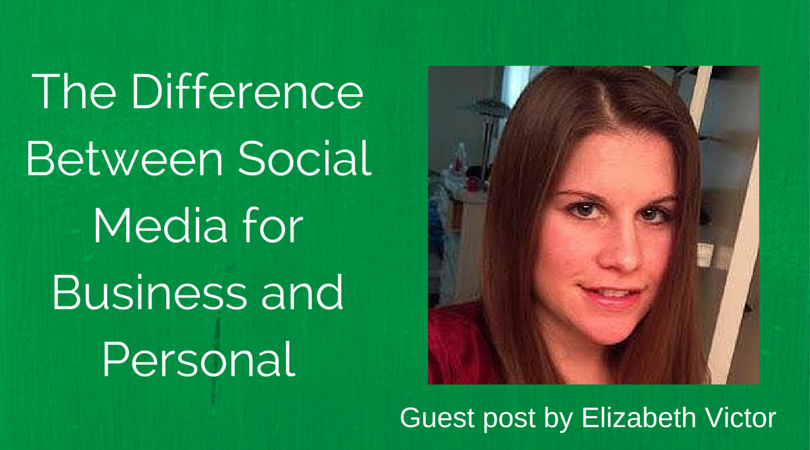The Difference Between Social Media for Business and Personal
This is a guest post — Elizabeth Victor is Brand Advisor for Isentia Media Advisory. She enjoys sharing tips on social media analysis and monitoring, as well as PR monitoring. Connect with Elizabeth.
Welcome Elizabeth…
Social media is quite different when using it for business vs. personal use. The goals are different, the interaction is different, and the posting is different, even if you maintain a professional persona on your personal page. At least, it should be.
The purpose of this article is to highlight the differences between personal and business use and to share best practices for each type of social media user.
Social Media for Businesses
Social media for business is growing in importance for businesses and professionals. By definition, this gives organisations a chance to be social with their customers, clients, and potential consumers. However, it is important to remember that for businesses, social media is about engagement and interaction. It is not about selling and your social media channels are not a pure sales platform.
Sure, you can pepper in occasional updates about sales, specials, and featured items, but every post should not be a sales pitch. Think of it as the equivalent of going to a networking event and standing there shouting out your specials and best products. That doesn’t work for social media any better than it would in a regular social setting such a networking event or conference.
For businesses, your social channels should be there to engage and interact with your customers, clients, followers, and fans. Finding the right balance is imperative. Each type of business is different, and each audience is different. What works for one business on social media might not work for another. You have to find what works for you and keep testing and changing things, as variety is very important, as it would be in any social setting. If you are just getting into social media for your business, you should definitely study what these companies did wrong and make a note not to follow suit.
Personal Pages Should Still be Professional
When using social media for personal use and on your personal pages, of course, there is much less structure. However, it is still important to remain professional and positive. You never know where your next job, client, or sale will be coming from. So, your “friends” could be your next boss, lead, sale, or business connection.
Therefore, even your private social media profiles could be subject to scrutiny. Of course, your public facing profiles should look very professional and proper. This includes your pictures, your political views, religious views, and anything else that could be considered a strike against your professionalism. In the tough job market, employers are taking a look at candidates’ online profiles before making a decision in the hiring process.
Websites like CareerBuilder, Forbes, and Fast Company all report that employers use social media as a way to prescreen candidates. Many employers report not hiring a potential candidate because of questionable behavior they found on their public social media profiles including inappropriate photos, evidence of drinking, drugs, or other illegal behaviors, discriminatory comments about race, religion, gender, or politics; and one of the top reasons cited is that they bad mouthed a previous employer or company of employment.
Content is King
If you take a look at a successful social media pages (both personal and business), the common denominator is going to be the content shared and the interaction surrounding that content. Successful pages will have a blend of sharing, liking, and commenting on other’s pages, but their own page will have great content that is informative and/or entertaining. The business or the individual will spend time responding to others’ comments and monitoring what is being said about them or their brand.
Overall, the content is king. Successful pages or people are sharing information that is informative, educational, and entertaining. This cannot always be done within the confines of a social channel. It takes more than 140 characters, or even a Facebook post to share information. Leading your friends, followers, customers, etc. to landing pages with articles, videos, and other rich media helps to ensure that they are getting something out of the social relationship they have with you.
A great example is Martell Home Buyers. They focus on their blog and also make an impact with photo updates that feature homes as they are being built as well as happy families in their new homes.
Conclusion
Social media is important to so many people and businesses. You get back what you put into it. However, what you put into it must be done with care. Personal pages must still adhere to professional standards. Business pages must be engaging and interact with fans and followers while providing entertaining or informative content. It is important to remember that many of the same social cues and etiquette apply, and it is similar to being at a networking event or conference.
Even if sales are your goal, being overly sales-like will end up putting off customers, clients, fans and followers rather than endearing them or resulting in purchases. Instead, stay top of mind by delivering engaging, informative, and entertaining content and the return on your investment will be great.

Elizabeth Victor is Brand Advisor for Isentia Media Advisory. She enjoys sharing tips on social media analysis and monitoring, as well as PR monitoring. Twitter: @evictorisentia
Content Marketing Sales Funnel
Your content marketing sales funnel is all about getting people to know, like and trust you by nurturing them with the right information at the right time.


